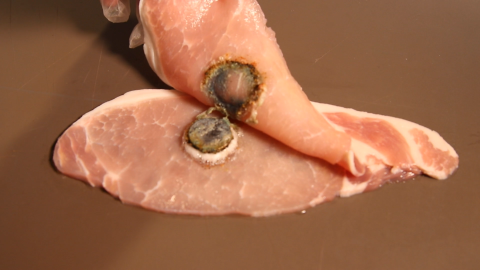PHA warns of dangers of ‘button batteries’ this Christmas

Parents and carers are being warned to be alert to the dangers of ‘button batteries’ this Christmas, with the Public Health Agency (PHA) highlighting how easily things can go wrong.
Lithium cell batteries, also known as ‘button batteries’, are common in many children’s toys but are a significant danger to a child or adult’s health if swallowed.
They can cause choking, poisoning, or burning, and can lead to life-changing injuries or even death.
Janine Gaston, the PHA’s Lead on Home Accident Prevention, said: “This time of year sees many toys coming into households and it can be hard to keep track of which ones are using button batteries.
“Toys, Christmas cards, electronics, and lighting sets can all be a potential hazard, especially for young children, as sometimes their first instinct is to put something in their mouth.
“If undetected, button cell batteries can do serious damage to the gastrointestinal system. Lithium batteries react with saliva, creating an electrical current which results in a build-up of caustic soda, which will burn through the oesophagus and major blood vessels.
“Serious injuries and even death can be caused as a result and sadly, while button swallowing related deaths are rare, there is still that risk.”
Top tips to help protect young children from the dangers of button cell batteries:
- battery compartments should be checked to make sure they can’t be opened or broken easily;
- the Toy Safety Regulations require toys that use button batteries to have lockable battery compartments. Check that these are secure and undamaged and do not use toys that don’t have lockable compartments. Take care when changing batteries to make sure the compartment is secured afterwards and the old battery is disposed of safely;
- keep spare batteries in a safe place out of reach of children;
- if you suspect your child has swallowed a button battery, seek medical help immediately.
“Anyone who has care of children this Christmas needs to be aware of just how dangerous these batteries can be,” Janine continued.
“It’s the same as any other poisonous substance – they should be kept out of the sight and reach of children.
“Making sure you follow age guidelines and applying common sense in assessing whether a toy is suitable for a child are other ways you can ensure their safety and wellbeing.
“If you think there are risks associated with the toy, then it’s best to avoid buying it.”
A PHA video demonstrates the damage a button cell battery can do: www.pha.site/buttonbattery
- To find out more about toy safety visit www.rospa.com/home-safety/advice/product/toy-safety
